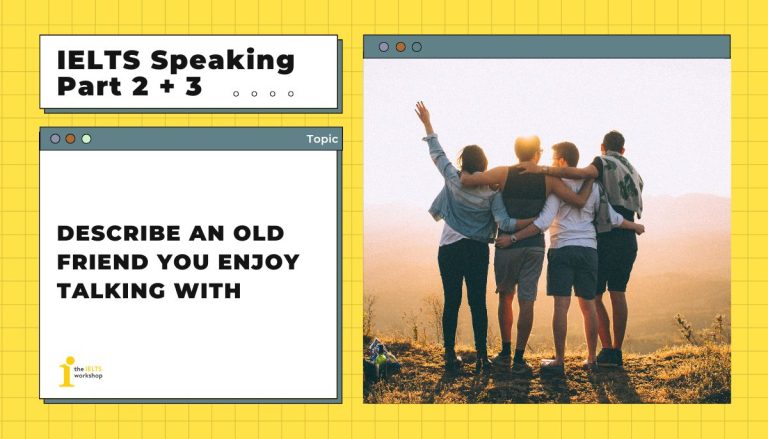Trong bài giải mẫu lần này, cô Mai Linh của The IELTS Workshop sẽ hướng dẫn bạn trả lời topic “Describe an old friend you enjoy talking with“ trong IELTS Speaking Part 2. Cùng tham khảo sample, từ vựng và một vài cách diễn đạt ghi điểm trong phần thi IELTS Speaking nhé.
Part 2: Describe an old friend you enjoy talking with
Describe an old friend you enjoy talking with
You should say:
Who this person is
How you knew him/her
What you usually talk about
And explain why you want to talk to this person
Dưới đây là bài mẫu cho topic “Describe an old friend you enjoy talking with”.
1. Bài mẫu (Sample)

2. Từ vựng (Vocabulary)
- (like) a breath of fresh air (n) (như) một luồng sinh khí mới
- hit it off right away (v) có mối quan hệ tốt với ai (từ lần đầu gặp)
- inseparable (adj) không thể tách rời
- two peas in a pod (idm) rất giống nhau (như hai hạt đậu)
- feel down (v) cảm thấy buồn
- have a knack for sth (v) có khả năng đặc biệt / rất giỏi (trong việc gì)
- therapy (n) sự trị liệu
Part 3:
Bên cạnh Part 2, bạn hãy tham khảo thêm Part 3 cho chủ đề này nhé
Where do young people like to meet?
What do young people talk about when they meet up?
Do you think people should be honest when talking with friends?
On what occasions do people talk with strangers?
On what occasions one should remain silent?
1. Where do young people like to meet?
Well, it depends on the vibe they’re going for. These days, a lot of young people like to meet at cafes—it’s super trendy, and you can chill over coffee without spending too much. If they’re feeling more social, they might go to a park or a shopping mall, especially if there’s a food court or some fun activities like an arcade.
Of course, online meetups are huge now, too. Gaming platforms, virtual hangouts, or even social media groups have become common places for young people to connect. But I’d say, if they’re looking for face-to-face interaction, it’s usually somewhere casual and affordable—places where they can relax and have a good time without any pressure.
- food court (n) quầy thức ăn
- arcade (n) trò chơi máy thùng
- online meetups (n) gặp mặt trực tuyến (video call,…)
- platform (n) nền tảng
- casual (adj) bình thường/ không quá sang trọng
- affordable (adj) vừa túi tiền
2. What do young people talk about when they meet up?
When young people meet up, their topics of conversation often vary depending on their age, interests, and social circles. For instance, teenagers are likely to talk about school, friendships, or hobbies like music, sports, or gaming. Their conversations might be more lighthearted and focused on shared activities or trends, such as social media or fashion.
In contrast, young adults often discuss more mature and goal-oriented topics. They might talk about their careers, education, or future plans, such as traveling or starting a business. While teenagers lean more toward casual and spontaneous discussions, young adults are more likely to have deeper, reflective conversations, especially about relationships or personal growth.
- meet up (v) gặp gỡ
- lighthearted (adj) vui vẻ, không thuộc vấn đề nghiêm trọng
- goal-oriented topics (n) các chủ đề liên quan tới định hướng
- lean more toward sth (v) thích cái gì đó hơn
3. Do you think people should be honest when talking with friends?
I believe honesty is crucial when talking with friends, but it should be paired with tact and empathy. Being truthful helps build trust and strengthens the foundation of the friendship. For example, if a friend is making a mistake, an honest conversation can help them see things from a different perspective.
However, it’s also important to consider how the truth is delivered. Being blunt or overly critical can hurt someone’s feelings, even if the intention is good. So, it’s about striking the right balance—being honest while also being considerate of their emotions.
In comparison, some people argue that withholding the truth occasionally might be better, especially if it prevents unnecessary conflict or discomfort. For instance, small white lies, like complimenting a friend’s cooking even if it’s not perfect, can sometimes maintain harmony. So, honesty is clearly needed, but it’s essential to approach it in a way that doesn’t harm the friendship.
- be paired with: đi đôi với
- see things from a different perspective (v) nhìn mọi việc từ một góc độ khác
- blunt (adj) thẳng thừng quá mức
- strike the right balance (v) cân bằng, hài hòa
- white lies (n) lời nói dối vô hại
4. On what occasions do people talk with strangers?
People often talk with strangers in situations where interaction is necessary or socially expected. For instance, they might strike up a conversation while traveling, such as on a plane or train, especially if they’re seated next to someone for a long period. It’s a way to pass the time and make the journey more enjoyable.
Another common occasion is at social events, like weddings, conferences, or community gatherings. In these settings, people often feel encouraged to meet new individuals and exchange small talk as part of the event’s purpose.
In comparison, casual encounters, like asking for directions or chatting with a barista at a coffee shop, tend to be more functional and brief. These interactions are usually centered around a specific need rather than building a relationship.
- strike up a conversation (v) bắt chuyện
- exchange small talk (v) nói chuyện phiếm
- casual encounter (n) cuộc gặp mặt thông thường/ thường ngày
5. On what occasions one should remain silent?
There are times when staying silent is more appropriate than speaking. For example, during formal occasions like ceremonies, meetings, or religious services, silence is a sign of respect and helps maintain order. Similarly, in moments of conflict or tension, remaining quiet can prevent saying something regrettable and allows time for reflection.
Silence is also important when someone is sharing their thoughts or feelings, as it shows attentiveness and respect for their perspective. In certain cultural or social contexts, staying silent can even convey humility or understanding better than words. Knowing when to hold back demonstrates emotional maturity and sensitivity to the situation.
- formal occasions (n) những dịp/ sự kiện trang trọng
- regrettable (adj) đáng tiếc
- attentiveness (n) sự chú ý
- hold back (v) kìm lời lại
Bài mẫu bởi cô Mai Linh – Giáo viên The IELTS Workshop
Các bạn có thể tham khảo các bài mẫu IELTS Speaking Part 2 của The IELTS Workshop cũng như tham gia bài test trình độ tiếng Anh và nhận tư vấn lộ trình miễn phí tại đây!
Tham khảo ngay Khóa bổ trợ từng kỹ năng IELTS của The IELTS Workshop để cải thiện kỹ năng Speaking bằng phương pháp Mentor 1-1 nhé.









